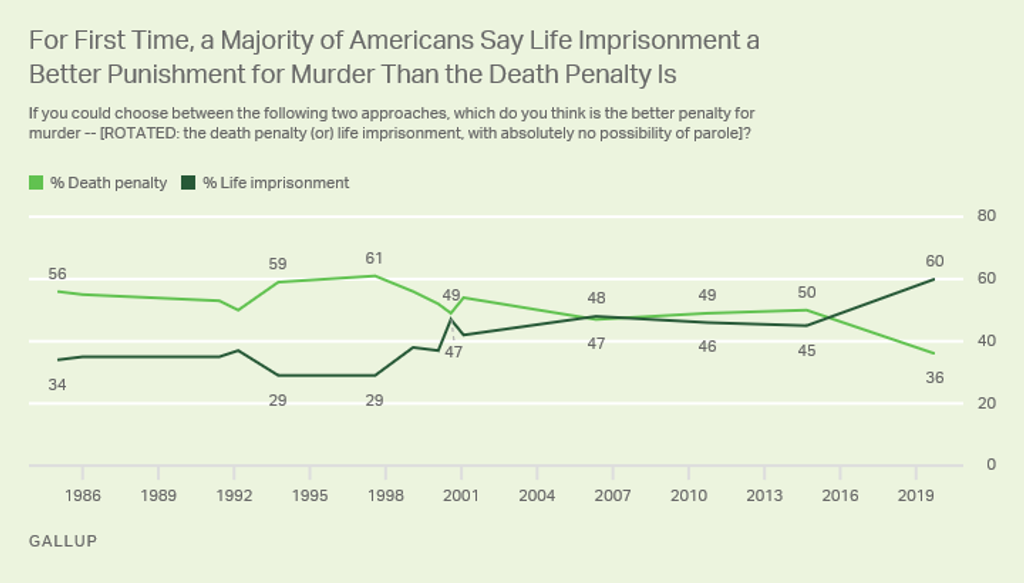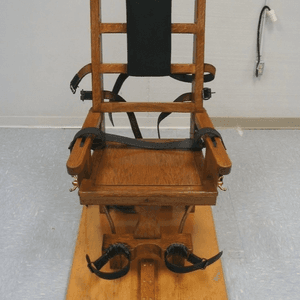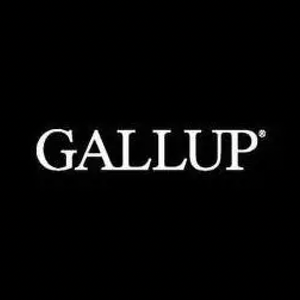
For the first time since Gallup began asking the question in 1985, a majority of Americans now say life imprisonment is a better approach for punishing murder than is the death penalty. According to the 2019 Gallup death-penalty poll (click here to enlarge graphic), 60% percent of Americans asked to choose whether the death penalty or life without possibility of parole “is the better penalty for murder” chose the life-sentencing option. 36% favored the death penalty.
The response reflects a 15-percentage-point shift in American’s views towards capital punishment in just five years. In 2014, the last time Gallup asked the question, 50% said the death penalty was the better approach to punishing murder, while 45% preferred life in prison. “This is a pretty dramatic shift in opinion,” Gallup Senior Editor Dr. Jeffrey Jones, who conducted the survey, told the Tulsa World.
The shift away from capital punishment crossed partisan lines, though it was more pronounced among Democrats and Independents. In his analysis of the poll for Gallup, Jones wrote, “all key subgroups show increased preferences for life imprisonment. This includes increases of 19 points among Democrats, 16 points among independents, and 10 points among Republicans.”
Gallup also surveyed Americans’ views of the death penalty in the abstract, asking respondents the yes or no question: “Are you in favor of the death penalty for a person convicted of murder?” For the second straight year, 56% said they favored the death penalty. It was the second lowest level of support for the death penalty in 47 years, one point above the 55% who said they supported the death penalty in October 2017.
Opposition to the death penalty increased to 42%, the highest percentage of Americans to say they oppose capital punishment in the modern history of the U.S. death penalty. The last time Gallup measured a higher level of opposition to the death penalty was in May 1966, when 47% opposed capital punishment. The only other time in the history of Gallup’s death-penalty polling that opposition to capital punishment was higher was in January 1965, when 43% of respondents told Gallup they opposed the death penalty.
Support for capital punishment peaked at 80% in 1994 and had been at 60% or above every year from 1976 through 2016. The last time public support for capital punishment polled lower was in March 1972, just before the U.S. Supreme Court declared U.S. death penalty statutes unconstitutional in Furman v. Georgia.
The 2019 poll showed a wide demographic preference for life, rather than the death penalty. Majorities of men and women, whites and non-whites, and all age and educational demographics responded that life without parole was a better approach than the death penalty for punishing murder. Non-whites (72%), young adults aged 18-34 (68%), women (66%), and college graduates (65%) most strongly preferred the life-sentencing option.
Among party affiliations, 79% of Democrats and 60% of Independents chose life without parole as a better approach than the death penalty. 19% of Democrats and 35% of Independents preferred the death penalty. 58% of Republicans preferred the death penalty, with 38% saying life without parole was the better approach. Those considering themselves liberals or moderates preferred the life option by large margins (77% to 20%, and 65% to 32%, respectively). Conservatives were divided, narrowly preferring the death penalty, 51% to 46%.
There were significant differences in each demographic category on the question of support for the death penalty in the abstract. 62% of men, but only 50% of women said they were in favor of the death penalty. 61% of white respondents were in favor of capital punishment, while 53% of non-whites were opposed. A bare majority of young adults, aged 18-34 said they opposed the death penalty (50%-49%), while 58% of those aged 35-54 and 59% of those 55 or older were in favor. College graduates narrowly opposed the death penalty (51%-48%), while 59% of those with some or no college education said they favored it.
Views on the death penalty varied widely along political and ideological lines. Republicans strongly supported the death penalty, 80% to 18%. However, one quarter of those identifying themselves as conservatives said they were against the death penalty, reflecting the growing opposition to capital punishment among ideological conservatives. Democrats and those considering themselves liberals opposed the death penalty (61%-39% and 65%-34%, respectively), while Independents and those identifying as moderates favored the death penalty 53%-43%.
The 24-percentage-point drop in public support for the death penalty coincides with a large national decline in death sentences and executions in the United States. New death sentences have fallen by 85% since the mid-1990s, when more than 300 new death sentences were imposed for three consecutive years. Annual executions have fallen by approximately 75% since peaking at 98 in 1999. Both death sentences and executions have declined by half since the start of this decade.
The 2019 Gallup death penalty poll was administered in two parts. From October 1-13, Gallup asked a random sample of 1,526 Americans the question whether they were in favor of the death penalty. From October 14-31, Gallup asked a random sample of 1,506 Americans which of the two approaches to punishing murder they thought was better, the death penalty or life without possibility of parole. In 2018, Gallup asked Americans if they believed capital punishment was fairly applied in the United States. For the first time since the organization began asking that question in 2000, fewer than half of respondents said they believed the death penalty was fairly applied. Gallup did not include that question in the 2019 poll.
Sources
Jeffrey M. Jones, Americans Now Support Life in Prison Over Death Penalty, Gallup, November 25, 2019; Mark Berman, Most Americans now favor life in prison over the death penalty for convicted murderers, Wahington Post, November 25, 2019; Samantha Vicent, Gallup survey reveals most Americans support life imprisonment over death penalty, Tulsa World, November 25, 2019.
Public Opinion
Mar 11, 2024

OP-ED: Journalist Recalls Witnessing an Execution and Describes the Importance of Media Witnesses
Public Opinion
Nov 06, 2023

POLL: For the First Time, More Americans Believe the Death Penalty Is Applied Unfairly in the United States
Sentencing Alternatives
Aug 21, 2023


